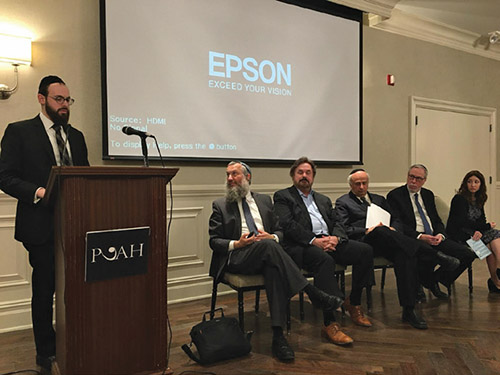
PUAH, a renowned fertility organization dedicated to providing halachic and medical guidance, recently held its annual symposium on the topic of Genetics 101: Everything your family needs to know. The seminar, held at Congregation Bnai Yeshurun, welcomed all guests free of charge, and covered a range of topics including genetic screening and fertility issues. The event was dedicated in memory of Rabbi and Mrs. Pruzansky’s granddaughter, Avigail.
PUAH’s mission is comprised of a few different components which focus on counseling couples facing infertility, supervising laboratory procedures to ensure halachic certainty and educating the greater Jewish community about genetics. This year’s symposium was largely dedicated to understanding genetics and spreading awareness about the importance of screening.
The symposium drew a large crowd from communities throughout the metropolitan area. Rabbis, physicians and community members were enlightened by featured speakers which included Rabbi Dr. Aaron Glatt, Dr. William Kearns, Temima Wildman Lebowicz, MS, CGC, Dr. David Pelcovitz, Rabbi Steven Pruzansky, Rabbi Elan Segelman, Rachelle Sirota (a financial advisor), and Rabbi Gideon Weitzman.
The program covered a selection of topics such as DNA & halacha, genetic abnormalities and pregnancy loss, genetic screening 101, how to handle genetic issues in shidduchim and life, and affording fertility treatment. The symposium concluded with an opportunity for participants to ask questions to the panelists.
Rabbi Elan Segelman, the rabbinic advisor for PUAH in America, was both the emcee and a guest speaker. “Genetics plays a large role in a person’s life and we see a lack of awareness among members of the greater community,” he said. “At PUAH we know that genetics plays a significant role in building healthy families, which is our ultimate mission.”
Rabbi Segelman explained he recently met with a couple experiencing fertility problems. After a detailed conversation, it was disclosed that certain extended family members have learning and behavioral issues which can likely be connected to a genetic factor. Understanding the role of genetics in the reproductive system, Rabbi Segelman pointed out that this couple was possibly suffering from infertility due to a genetic disorder that was not previously identified.
“I encouraged them to undergo a thorough genetic screening process. Sure enough, the results showed that there was, in fact, a severe genetic disease in the family. They simply never thought to attribute a family member’s behavioral issues to a specific genetic disorder,” explained Rabbi Segelman.
Genetic screening can be relevant at various stages of a person’s life. In some cases, people do genetic screening before they start dating, for others it is prior to engagement. There are married couples who elect to do genetic testing before becoming pregnant and some who consider it for additional pregnancies as well. Testing can reveal essential information regarding our own health and genetic conditions, as well as those of our children.
Most people possess one or two mutations which could cause possible disorders. Being aware of one’s genetic history is, at the very least, important information to have and more importantly could influence certain decisions for the future.
The BRCA gene is one such example of a genetic mutation that can be passed down from one generation to the next. In this situation, as in many others, genetic testing can be imperative in preventing life threatening diseases. It has always been said that knowledge is power, which is exactly why the experts at PUAH believe the more information we collect the more empowered we become.
“I am passionate about education as a cornerstone in helping people build healthy families. In the many years of working with PUAH I have witnessed how correct information was life changing and life building. This is why PUAH is committed to bringing vital education to the community. Especially today as reproductive science has developed tremendously, information is a vital tool in the fertility journey,” said Lea Davidson, Executive Director of PUAH.
There are many misconceptions regarding genetic history and how one may or may not be affected. Every person can be prone to genetic abnormalities, regardless of whether or not there is a family history. Therefore, PUAH strongly advises the entire community to recognize genetic screening as a critical endeavor to safeguard everyone’s health and the health of our future generations.
PUAH is devoted to educating the public and tries hard to make information accessible to all. For those who were unable to attend, recordings of the talks are available online at puahfertility.org or email office@puahfertility.org. For additional information, please call 718-336-0603.
By Andrea Nissel









